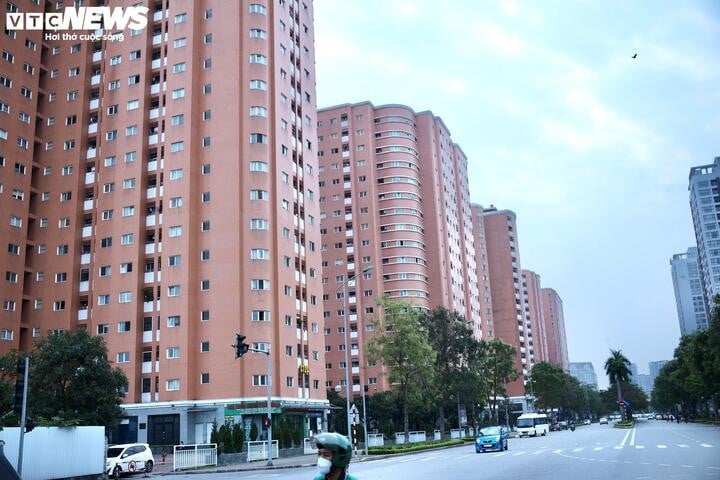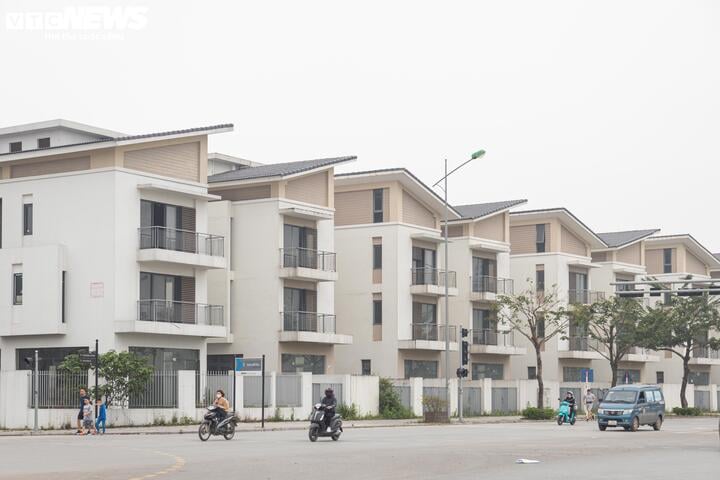Sudden braking, cash flow is difficult to enter the market
Mr. Le Dinh Chung, General Director of SGO Homes, said that the proposal to impose personal income tax (PIT) on real estate transfers based on holding time is to prevent speculation. But in fact, the people who are being heavily affected are investors participating in the market with the goal of making legal profits.
" We need to clearly distinguish between speculation and investment. Speculation is actually not much anymore ," said Mr. Chung.
Mr. Chung also pointed out that in the current context, if this tax law is implemented, investors may be limited in participating in the market. Meanwhile, with a real estate project for sale, in addition to real home buyers, there is also a large number of investors. Therefore, when investors hesitate, cash flow into the market slows down, projects will have difficulty selling, the market will likely fall into a state of "frozen" liquidity, and investors will not find an outlet for their products.
Not only does it freeze the market, the transfer tax proposed by the Ministry of Finance also potentially causes real estate prices to increase sharply.
Explaining this, Mr. Chung said that without the participation of investors, a project would take 7 to 10 years to sell out. Financial costs, especially interest, become a huge burden for investors. This cost will inevitably be added to the selling price, causing real estate prices to increase sharply in the primary market.
Similarly, in the secondary market, high taxes will be added by investors to the real estate selling price, pushing secondary prices to continue to escalate.
Mr. Nguyen Quoc Khanh, Chairman of DTJ Group, also said that this tax will paralyze the market, thereby affecting many other industries and the stable development of the entire economy .
Specifically analyzing, Mr. Khanh said, when taxes are too high, investors' expected profits will decrease, causing many investors to switch to other channels such as stocks and gold.
Mr. Khanh said that tax is an important tool to stabilize the market and promote a fairer distribution of assets. However, with people's income levels still low and housing prices rising, taxing too much could push them into a financial crisis.
If applied suddenly, tax policy can shock the market, leading to sell-offs, causing imbalances in banking finances, leading to many economic consequences. Therefore, it is necessary to follow a flexible roadmap with high flexibility.
High taxes will easily freeze the real estate market (Illustration: Cong Hieu)
Sharing the same view, Mr. Dinh Minh Tuan - Sales Director of the Southern region of Property Guru Vietnam Company, said that in the context of the market still recovering slowly, the tax increase is a "sudden brake" and not at the right time. The secondary market will freeze before recovering, causing a chain reaction to related industries that have not yet recovered, such as construction and building materials.
According to Mr. Tuan, the reality shows that real estate buyers like real estate but do not like to hold it for a long time. A recent survey by Property Guru Vietnam conducted with more than 1,000 people looking for real estate showed that 59% bought for investment purposes instead of to live in. Notably, about 39% of people who own real estate said they intend to sell within the next year.
This reality reflects two clear trends: Vietnamese people really like to invest in real estate, but hold it for a short time, often "sell when the price is right" and flexibly shift capital to other more profitable assets.
Therefore, Mr. Tuan said that the proposal to increase the tax rate based on the holding period by 2-5 times instead of applying the current fixed tax rate of 2% is to limit speculation and surfing, but the "surfing" group is making up a large proportion of demand, so the policy needs to be considered to avoid negative impacts on the capital market which is recovering slowly.
According to Mr. Tuan, the land and apartment segments, especially high-end apartments, will be affected first, because this is the preferred and popular investment type of individual investors. However, these investors often surf within 6-18 months to maximize profits. With a tax rate of 10% for holding periods of less than 2 years, profit margins will be significantly eroded, reducing investment attractiveness. This will lead to many small investors being eliminated from the game, and market liquidity will decrease.
" Land and apartment investors who are directly affected may sell their assets because they are worried about the proposal being applied, they want to trade before the new policy takes effect. The price of this product may decrease and the market will fall into a state of liquidity congestion, because new investors are also in a wait-and-see mentality ," said Mr. Tuan.
Therefore, he believes that real estate transfer tax should be applied based on holding time when the market is more stable, balanced and a database has been built to determine the selling price.
Mr. Nguyen Van Dinh, Chairman of the Vietnam Real Estate Brokers Association, also said that if high taxes are imposed on short-term transactions, many investors may hold on to their properties longer instead of selling, leading to a shortage of supply in the secondary market. Without accompanying measures to increase supply from new projects, housing prices may even continue to increase instead of decreasing.
The leader of a real estate company also said that applying a 10% tax rate on the selling price of real estate held for less than 2 years is too high, risking causing shock and paralyzing the liquidity of the fragile capital market.
According to him, if the above regulation is proposed, the tax burden will be pushed onto the end buyer, causing house prices to increase and making the policy ineffective in stabilizing. Not to mention that it could be an "excuse" for parties to trade at two prices to circumvent the law, causing budget losses and creating great legal risks.
Need to reduce taxes and extend holding period regulations
Experts say the proposed tax rate on real estate transfers is too high (Illustration photo: Minh Duc)
According to the Vietnam Association of Realtors (VARS), in reality in Vietnam, most speculative behaviors have a holding period of less than 1 year. Holding real estate for 5 years or more has ensured stability and longevity, so VARS proposed to consider adjusting the real estate holding period to determine the tax rate.
VARS recommended level personal income tax Adjusted as follows: Less than 1 year, tax rate is 10%; from 1 to less than 2 years, tax rate is 6%; from 2 to less than 5 years, tax rate is 4%; and from 5 years or more (or inheritance) tax rate is 2%. This plan aims to strongly target short-term speculative behavior, while encouraging long-term real estate holding, contributing to market stability.
VARS also believes that it is necessary to develop a clear implementation roadmap, in which the effective date is determined to be suitable to socio-economic conditions and market adaptability.
Applying new regulations too quickly, especially changes in tax calculation methods and tax rates, can lead to major disruptions, affecting taxpayer psychology and the stability of some markets, especially the real estate market.
Therefore, VARS recommends that the drafting agency carefully consider the timing and method of implementation to ensure feasibility, effectiveness and social consensus when the law is promulgated and put into practice.
Mr. Le Viet Hai - Chairman of Hoa Binh Construction Group also said that the income tax rate of 10% on the total selling price of real estate owned for less than 2 years is high, the rate of 5% may be more reasonable.
According to him, when the real estate market is not stable, policies should be applied gradually to help the market get used to them, avoiding sudden shocks. Therefore, the initial tax rate should be low and gradually adjusted upwards later.
“ Limiting speculation is necessary, but not eliminating investment. There should be a roadmap for tax rates so that the real estate market is not affected ,” said Mr. Hai.
According to him, policies need to be applied at the right time and adjusted gradually, so that the market has time to adapt, avoiding creating shocks that affect the entire economy.
Mr. Hai emphasized that all general regulations need to have a delay and reasonable adjustment steps, especially in the context of the real estate market that has not yet recovered.
In the draft Law on Personal Income Tax (replacement) that the Ministry of Finance is consulting on before submitting to the Government and the National Assembly , the ministry proposes to apply personal income tax to real estate transfers by individuals by multiplying taxable income by the tax rate of 20% for each transfer. This taxable income is determined by the selling price minus the purchase price and reasonable expenses related to generating income from the transfer of real estate. In case the purchase price and related costs are not determined, personal income tax is calculated by multiplying the selling price by the tax rate. The tax rate in this case will depend on the ownership period with a maximum rate of 10%. Specifically, the tax rate is 10% for real estate with a holding period of less than 2 years. The tax rate is 6% for real estate with a holding period of 2 years to less than 5 years. The tax rate is 4% for real estate held for 5 years to less than 10 years. For real estate held for 10 years or more and real estate derived from inheritance, the tax rate is 2%. For real estate originating from inheritance, the holding period is not calculated, but the transfer will be subject to a tax rate of 2% (as currently applied). |
Source: https://baolangson.vn/tang-thue-chuyen-nhuong-bat-dong-san-chan-dong-tien-nguoi-mua-nha-o-thuc-chiu-anh-huong-nang-5054763.html







































































































Comment (0)